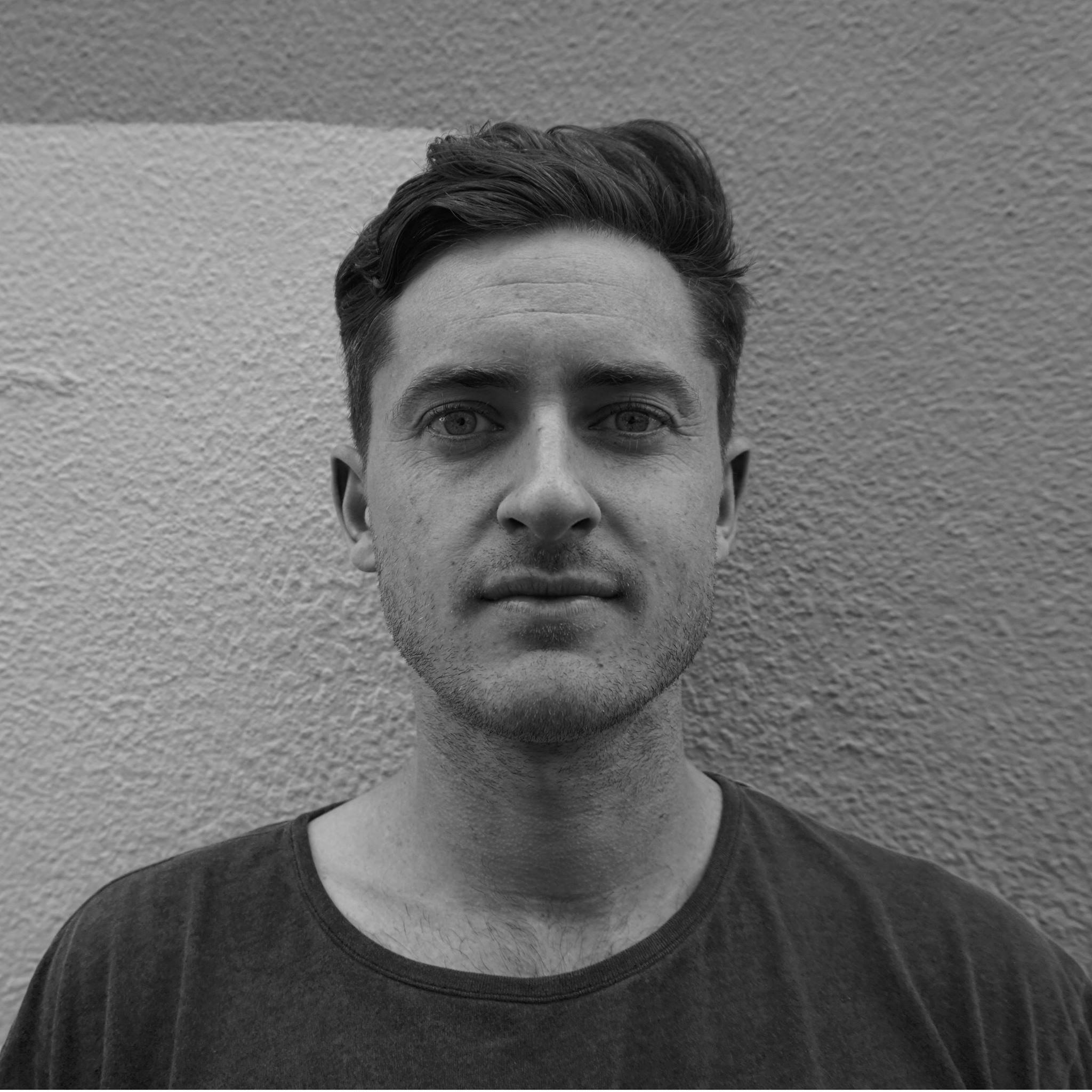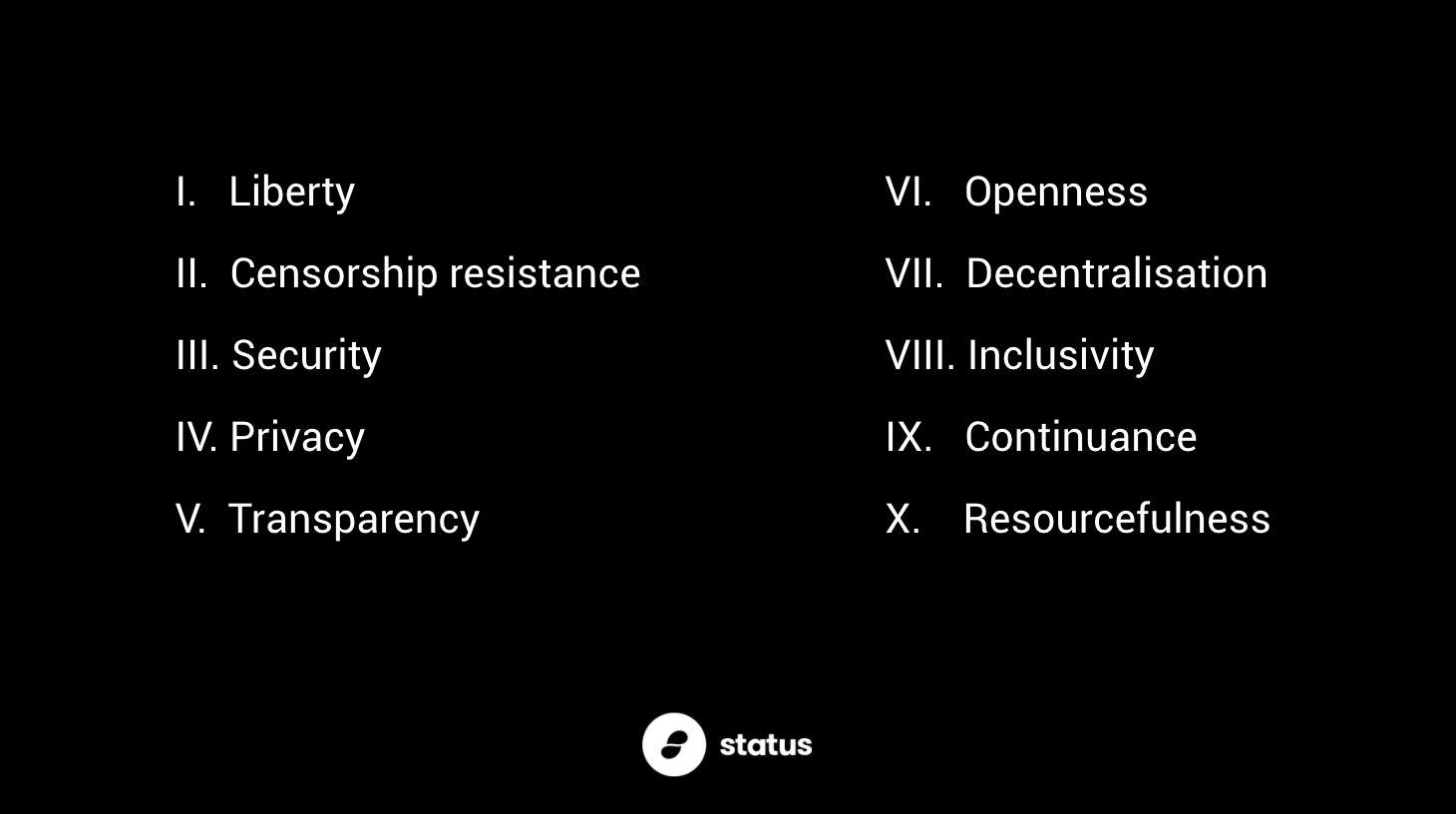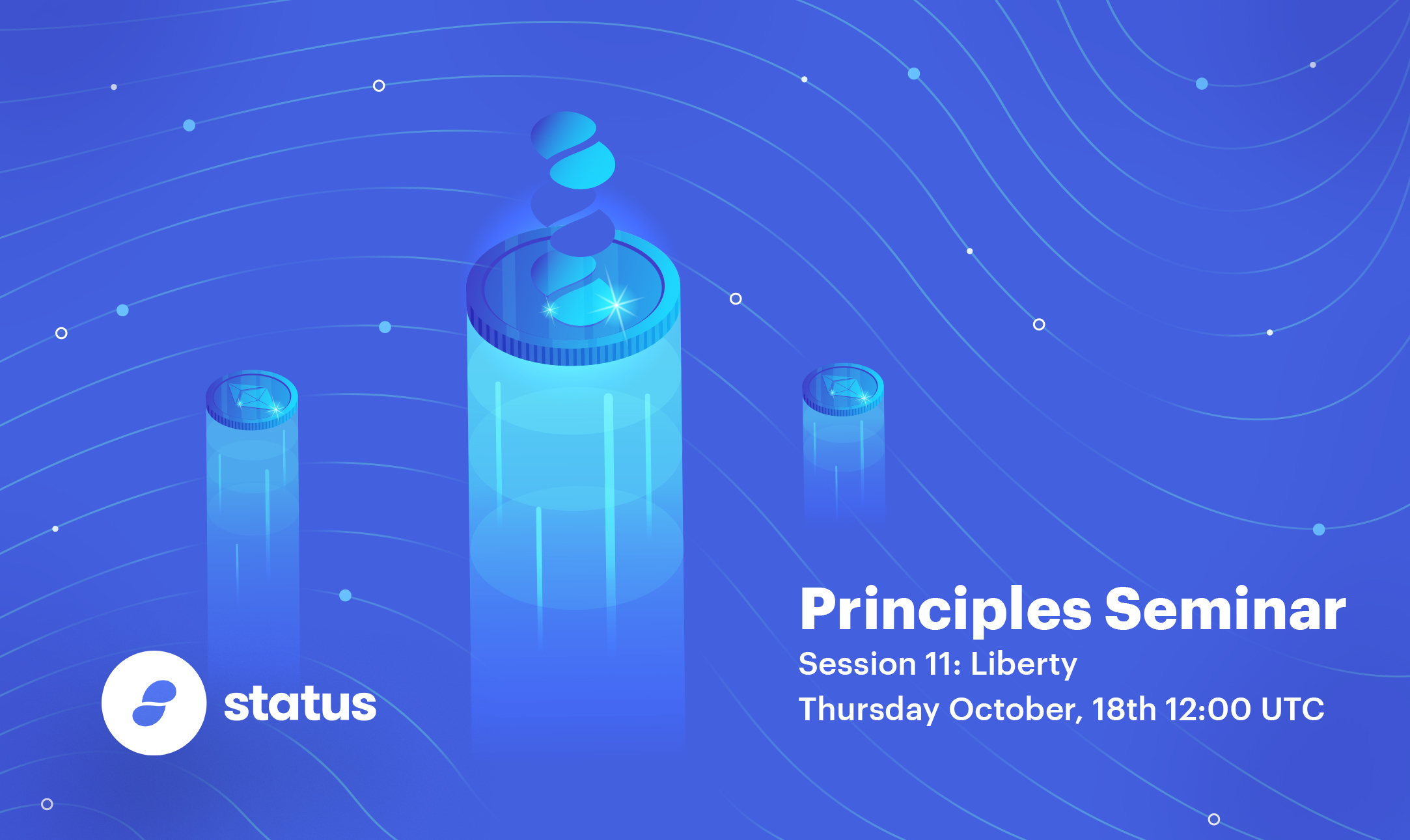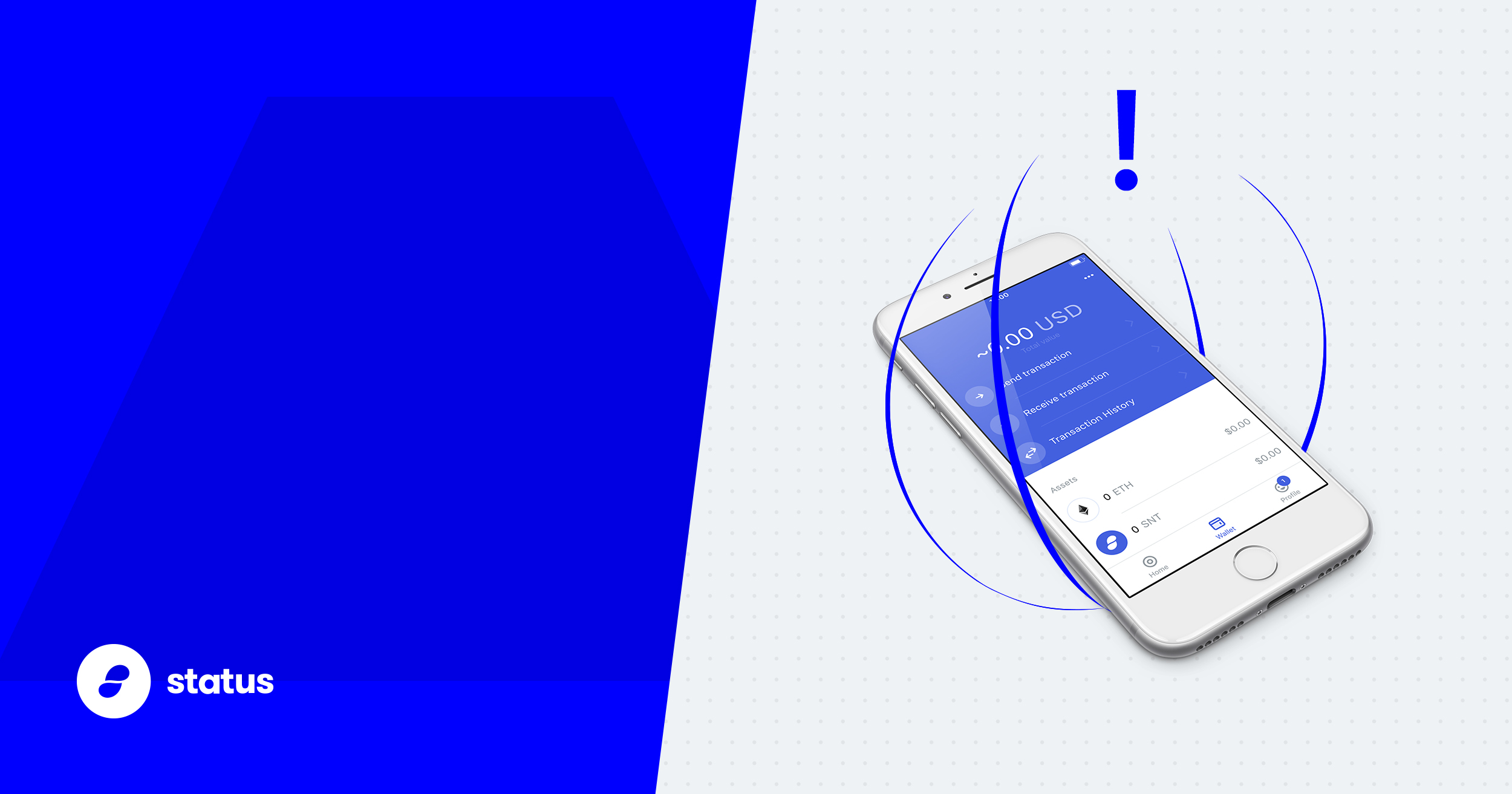The Status Principles Webinar


Status strives to be a secure communication tool that upholds human rights. We enable community money, community law and through privacy, preserve culture.
Our principles act as tools. Tools for thinking, for communication, and for decentralized decision making. They keep us honest about where we are failing short of our vision.
We hosted a quick webinar as a refresher of the Principles, why they are important and how they manifest themselves in the products, tools, and infrastructure we build.
For in depth analysis of each principle, check out the Principles Seminars hosted in fall 2018.
Presentation slides available for use here
We believe in the sovereignty of individuals. As a platform that stands for the cause of personal liberty, we aim to maximize social, political, and economic freedoms. This includes being coercion-resistant.
At a practical level, this means providing people with the right tools for their culture and experience to enable liberty and sovereignty. People come from various backgrounds and technical understanding. So we want to make tools that are accessible and usable by anyone.
This concept of Liberty is will put by John Stuart Mill in his book "On Liberty” which is about the self sovereignty of individual. The thesis is based around the individual vs some sort of authority. He argues that people should have autonomy over their lives as long as they do not harm other people.
--
Social Liberty Social Liberty - the state of being free within society from oppressive restrictions imposed by authority on one's way of life, behaviour
When we talk about Social Liberty, it means providing the tools an infrastructure to allow people to socially coordinate and fight for their own personal liberties. A good example of this is the Suffragette movement in the US and Britain in the 19th and 20th centuries in which women were coordinate and fighting for the right to vote.
Or the civil rights movement in the US led by people like Dr Martin Luther King Jr, the decades-long struggle by African Americans to end legalized racial discrimination, disenfranchisement and racial segregation.
These are clear cases in which people and groups of people, are discriminated against and their social liberties are being marginalized. We build the tools to support these kinds people and these kinds of movements, both in coordination and the longevity of the cause.
Political LibertyPolitical - liberty of citizens to participate in the political life and affairs of the state
In Hong Kong, people are fighting for their political freedoms from mainland china. Hong Kong has been going under a transition period in which it was under British rule but handed over to China. The Umbrella protests which started in 2014 are driven by the desire for democracy and fueled by an opposition to bill that would have allowed suspects to be sent from the city to mainland China to face trial. During these protests, the people were required to coordinate and communicate with privacy preserving tools out of fear.
Hong Kong is a clear case in which people may have economic liberty but lack political freedom.
Catalan Referendum where the people of catalonia desire politcal freedom and independence from Spain. They held an independence referendum in 2017, which was passed by the Parliament of Catalonia. However, it was declared unconstitutional and suspended by the Constitutional Court of Spain after a request from the Spanish government, who declared it a breach of the Spanish Constitution.
Throughout the vote, some residents of catalonia were blocked from voting by the spanish government by blocking voting stations, intercepting ballots, arresting top catalonian officials, and even violence.
Economic LibertyEconomic - the fundamental right of every human to control his or her own labor and property.
Venezuela - highest inflation rate in the world. Making access to basic human needs a challenge. The GDP has fallen more than 35% over last 4 years which has been clouded by political oppression and corruption. An economy that became reliant on oil prices crippled the country when oil prices plummeted in 2014 - leaving much of the country in poverty.
Status aims to build tools to provide not only stability in places like Venezuela with volatile economies, but also to provide individual autonomy in regions marred by political and economic corruption.
Favelas in Brazil provide a different type of example. These communities built without any government authority or planning, typically have a reputation for violence. However, impromptu resourcefulness allows the favelas to operate cities within a city and are actually home to tons of creativity and diverse ideas. They could simply use with some of the tools to operate more seamlessly and promote a thriving economy.
With a bit of structure and transparent infrastructure, these communities can truly thrive and become sovereign autonomous economies.
Why - too often today, we see blatant censorship of ideas and information from centralized third parties such as corporations, platforms, and governments. It has seen by governments around the world during the outbreak of COVID-19 (even in places like US that takes pride in freedom of speech and of the press). Platforms such as facebook and other large social networks censor the type of information that can be shared (sometimes with the right intentions but how far to is too far).
How - Status leverages p2p protocols and removes the ability to censor communication as much as possible. Public channels serve as aggregators of news from multiple sources and People can trust that the content in these channels is not being censored by an authoritarian third party
Why - provide people with the tools they need to live autonomous, sovereign lives and be confident that there communications (all kinds including messages) are secure. With the removal of third parties, people must be confident that their comms or secure.
How - we leverage technologies such as e2ee to protect your messages and others to secure private keys and transactions. Status wallet is non-custodial to minimize the attack surface on your funds. We audit all of our contracts, run bounty programs, and implement detailed threat modeling to make strong security guarantees.
Why - Privacy is important no matter who you are. By giving into surveillance and accepting the fact that your information and data is readily available and usable for both governments and corporations, you are not only sacrificing your personal liberties but also compromising culture at large. Privacy is not only for those who are hiding something. It is not only for whisteblowers and activists. It is a basic human right and one we need to safeguard.
How - Anonymous account creation - psuedo-anonymous platform (no email, no phone number, no bank account) Multiple wallet accounts E2ee encryption and pfs Browser privacy and lack of analytics tracking in our software and properties (fathom) Future - metadata protection, ZK snarks for private transactions
Why:
- We talk about our software as a public good. But what is a public good? Looking at the resource quadrant here, we see that it’s an item that non-excludable - that one cannot be prevented from accessing it, whilst also being non-rival, i.e. the consumption of that good by one person doesn’t diminish another person’s ability to use it.
- We see communication, community, and ability to participate in free trade as inalienable human rights - creating Status as a public good is about putting the tools in the hands of people that facilitate this vision of open socio-economic networks. This is not about building proprietary tools, guarding intellectual property and seeking to profit from that.
- We strongly believe that Open source is one of the most powerful ideas of our generation.
- By making our code open source, we allow it to continue on beyond the lifespan of Status GmbH as a legal entity.
- Anyone can run, study, redistribute, and improve the software that we make. This is what we mean when we talk about free licensing of our tools, we don’t mean free of cost - we’re talking about the free software movement.
- Richard Stallman, brought the concept of open-source to the masses, stating that: "'Free software' is a matter of liberty, not price. You should think of 'free' as in 'free speech,' not as in 'free beer.'"
How:
- Permissionless - everyone can participate in the creation of Status. Think of it as analogous to Ethereum nodes - Anyone can download the code and run it on your computer, no permission, you’re in the network, you don’t need to ask anyone for permission. Reduces the coordination tax, you can just contribute
- If someone has a PR they can just open a PR and directly contribute to our code, this is what makes the free culture. We can involve everyone and benefit from different viewpoints, knowledge and ideas - regardless who they are or where they’re from. This infusion of different viewpoints makes our product so much stronger as it then is truly made for the people by the people.
- Although these ideas have their roots in software development, we also apply the principles in our project operations- marketing, design etc are all open channels allowing anyone to get involved. We acknowledge that there are practical and behavioural barriers to getting this right, but we always challenge ourselves to make participation permissionless.
- Our ambassador program is a huge step in advancing this principle, we love being able to collaborate with you all from around the world - Status is enriched by people like our ambassadors bringing their skills and talents to the network.
- Going to read you this quote from Jarrad from one of our earliest Wiki pages as I think it’s apt:
- Today, when you are first exposed to Status, you might see an instant messenger and wonder, "Whats the big deal? After all it’s just another instant messenger right? What makes Status different and more importantly why should I bother working on it?"
- If I had to answer in one word, I would say Decentralization.
- Now, that word might not have much meaning to you - it might even sound like a buzz word - but in our context, Decentralization has the potential to fundamentally to change the way we organize socially and to rebuild the Internet as it was originally imagined - a commons for innovation. By decentralizing all the things, we are changing the very foundation of civilization, providing a new infrastructural base that impacts everything else above, from our greatest institutions to our daily social interactions.
- There are two parts to this a) the decentralisation of people, and b) of computers
- As it relates to computers, we want to maximize the number of physical computers composing the network, the litmus test should be Can we shut down cluster and everything just works?
- The more nodes we have, the stronger we become as a network, this is a core principle that applies to the Ethereum network, but also peer to peer technologies that we make use of like Whisper.
- Having strength in our network makes it more robust - We can measure and optimize for this
- As it relates to people - you can think of both people and computers are both nodes in network
- Helpful to look at a definition of centralisation: ““concentration of administrative power in the central government at the expense of local self-government,” – Etymonline”
- It’s precisely this type of self-sovereignty that we’re trying to uphold - for both contributors and users alike.
- This means looking at ways to ensure the Status project governance is decentralised - we’re exploring various ways of doing this:
- Voting
- DAO as a permissionless procurement mechanism. essentially a system of smart contracts that lives on-chain allowing us to separate the functional roles of an organisation from the individuals that carry out the roles tasks. By ascending into the blockchain and giving our organisation over the DAO, we signal that what we're doing is bigger than us, that this software is a public collective good.
- Being decentralised helps us have the infrastructure in place to scale. Ultimately self-consistency is necessary for our survival as a project.
- One of our guiding litmus test questions should be - what happens if our GMBH goes away, what does Status’s operations then look like?
- These governance efforts are a work in progress.
Why - As mentioned previously, we want to build real tools for real people to use.
INCLUSIVITY
Why - As mentioned previously, we want to build real tools for real people to use.
Fair and widespread access:
- works on many devices including older mobile phones and resource restricted devices (nimbus)
- Is available in many languages
- Not just for first world users. Built for people of many backgrounds and levels of technical understanding.
- Access is not passive - meaning people can use, get involved and contribute as they wish.
Ease of use
- Usable for non technical users in a non threatening, intimidating way
- Software compatibility (works across multiple devices and does not require much technical set up to get started)
Social inclusivity
- Encouraging people to participate at any level of thier choosing.
- Participatin is fluid - there are many different ways to contribute wether it is simply using the app, contributing code, writing a post, or even just reading a blog article.
- People are free to participate as they choose
Interoperability
- Clear and well understood interface which is useful by others. We are part of the ethereum community and want to work well with other projects
- Building an open network for anyone to use. Not a closed network
Educational efforts
- To be inclusive, we need to share information and educate people on how to get involved. And this is not simply at a technical level such as understanding how protocols work, but also at the philosophical level. Educating people on why we are doing what we do and on topics such as the principles.
Why - by removing Status as the sole stewards of the tools we build, the network can exist without the need for core contributors. We are building tools and infrastructure as a public good designed to last, change, and be altered. We currently are heavily reliant on Status core contributors and funding. This is an area we need significal improvement both in educating people on how to continue Status as well as incentivize people to continue Status both at a philosophical and financial perspective.
How - Open source, education, decentralized governance and use of tools like Assemble. Distribution of fund management. We need an incentive to carry on the network. Varying clients running the underlying protocol.
- What we are building is very challenging. There is no denying that. So we need to be smart in how we approach problems, challenges, coordination, etc.
- We need to continue trying new things. Failing fast and learning from our failures in things like the tech and coordination.
- Encourage permission less participation. The potential power of a decentralized org is magnitudes larger than that of centralized orgs
- As we have learned, financial resources are not endless. We owe it to token holders to be smart and effective with the resources we have. It is or duty - Need to continually ask ourselves how we can be more resourceful with the funds available. How can we be more efficient in decision making, coordination (things lime async comms for a distributed team)



